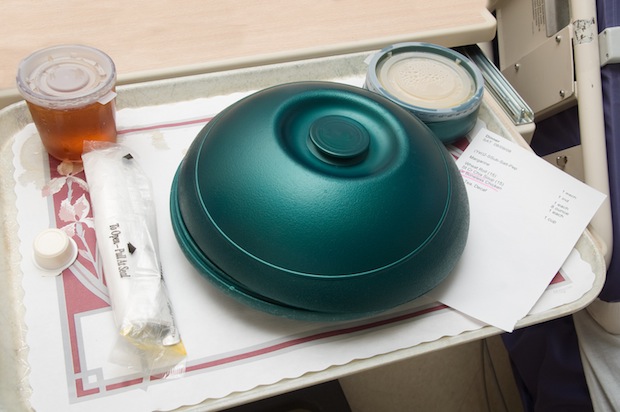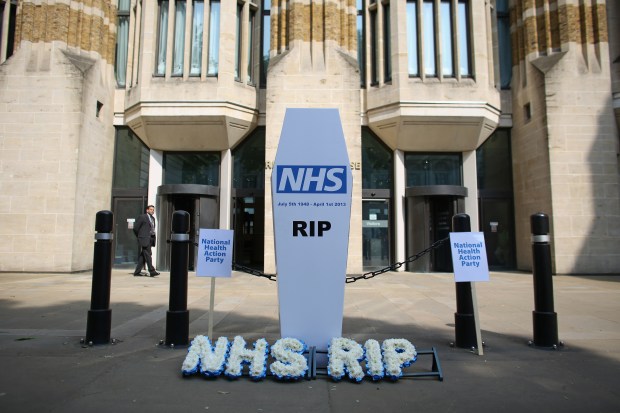One of the patients I see regularly as a voluntary hospital visitor, who has been in hospital for weeks, seems to be getting better. Still skeletally thin, he is now sitting up and complaining. His problem is that he longs for a jacket potato with just butter. He hates beans. But he might as well ask for gravadlax and dill. On the hospital menu, baked potatoes only come with baked beans.
I asked one of the Thai ladies who deliver the food if he could possibly have a plain spud. ‘Not possible,’ she said, ‘all with beans.’ She said she would go and ask someone, but who that might be I don’t know: I have never seen anyone in charge of food.
‘It’s hopeless,’ he told me. ‘I’ve asked them before, they won’t do it.’ The only alternative in the potato department is a wet grey mush, and people quickly learn to avoid the fish pie with its slimy contents and topping of grey cumulus blobs. One Spanish patient told me that in hospital at home they’d been served fresh fish most days from the local harbour. The medicine, however, wasn’t as good as the food, so she came here. When I asked her about the fish pie, she put her tongue out in disgust.
There are in fact a great many dishes on the long laminated menu card. You can have curried goat, ackee and saltfish, Arabic halal, Asian halal and Asian vegan, but no plain potato, ice cream, custard, diabetic desserts, or anything freshly cooked.
I had a look in the ward kitchen. It was sparkling clean, with acres of shiny stainless steel sinks and bright lights. It could have doubled as an operating theatre except it was unused, apart from four gleaming microwaves for defrosting. Not even an egg is boiled in there. When I was a patient in 2010, one day out of sheer mischief, I asked for a fried egg for breakfast. I was told emphatically that this was impossible. The Thai tea lady tittered, as if I had demanded a full English.
This isn’t a trivial issue. Over the past year, in the big London teaching hospital where I visit, I’ve seen people of all ages, but particularly the old, fading away from lack of nourishment. I used to urge them to eat, saying things like ‘You must try to build yourself up’, but there was no point.
Making sure patients who struggle to eat are actually fed is another problem. There is now a system of using red trays for people who are not eating but this does not always work. I was in a bay recently with three women being looked after by one young care assistant. She was getting one of them up but at the same time another needed help to get to the lavatory, and the third ‘red tray’ patient needed feeding. She was sitting in front of a bowl of soggy cornflakes which were removed before she’d eaten anything. I was there to help that morning, but usually I’m not. These days you need to be tough and well nourished before you enter hospital if you want to survive.
I put this, and the incident of the potato, to a doctor. ‘People tell me these things all the time,’ he said rather desperately. ‘But that is the way it is. The NHS is a huge bureaucracy and nothing ever changes.’
Last week it was been revealed that, on the strange planet known as the NHS in England, hospital trusts have been hiding the poor state of their food. They carry out annual assessments of the quality of hospital food and in 2011 rated 98 per cent of their meals‘good’ or ‘excellent’. But the Campaign for Better Hospital Food says that surveys show nearly half of patients were dissatisfied with what they were offered.
Alex Jackson, co-ordinator of the campaign, wants food standards to be set for all hospitals. But I wonder if more bureaucracy is the answer. The solution is probably as impossible as getting a cooked breakfast; hospitals need more money, good cooks and common sense.
After my shift I went to the staff canteen for lunch. It’s not great — they use water instead of milk in the cheese sauce and the much-vaunted English puddings taste of Aspartame, but there are trays of hot cooked food, good chips, fresh salads and hecatombs of baked potatoes naked as nature intended. It seemed such a pity that some of that food couldn’t be delivered to the wards, just a short distance away.
Got something to add? Join the discussion and comment below.
Get 10 issues for just $10
Subscribe to The Spectator Australia today for the next 10 magazine issues, plus full online access, for just $10.
Jane Kelly is a consulting editor for the Salisbury Review.
You might disagree with half of it, but you’ll enjoy reading all of it. Try your first month for free, then just $2 a week for the remainder of your first year.














Comments
Don't miss out
Join the conversation with other Spectator Australia readers. Subscribe to leave a comment.
SUBSCRIBEAlready a subscriber? Log in